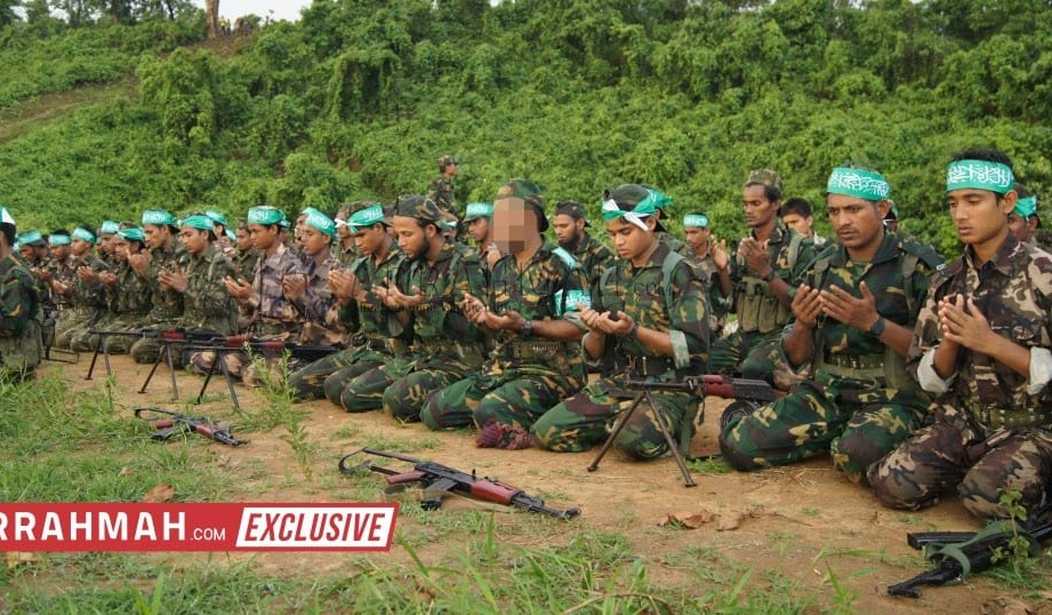A retired senior State Department official who previously served in Myanmar is taking issue with the prevailing international media narrative concerning Myanmar. She does not agree with the coverage of the ongoing crisis between the country’s security forces and reportedly tens of thousands of Rohingya Muslims, who are fleeing from the volatile Rakhine province to Bangladesh:
AFP factfile on Myanmar's Rohingya Muslims and the ongoing violence in Rakhine state https://t.co/SoMqMjpSpi pic.twitter.com/KEEUqqZAkR
— AFP news agency (@AFP) September 6, 2017
Much of the international criticism has been directed at Aung San Suu Kyi, Myanmar’s foreign minister and state counsellor — as well as the 1991 Nobel Peace Prize winner for her peaceful resistance campaign against the country’s longtime military junta rulers. She is now accused of indifference to the Rohingyas’ plight, with some calling for her Nobel Prize to be revoked:
Aung San Suu Kyi comes under fire over her response to the Rohingya crisis https://t.co/0ACiDxEVt2 pic.twitter.com/7n3QR7drvU
— Bloomberg (@business) September 7, 2017
But Priscilla Clapp — a 30-year State Department diplomat who served as U.S. chief of mission in Myanmar from 1999-2002, and now is a senior adviser at the U.S. Institute for Peace — is pushing back on the claims of the media and human rights groups.
In a Thursday appearance on France 24, Clapp said that Kyi had been working with a United Nations commission led by former Secretary General Kofi Annan on peace efforts in the region. According to Clapp, the recent large-scale attacks by foreign-funded Islamic terrorist groups targeting Myanmar’s security forces, which sparked the current crisis, were purposefully timed to derail those efforts.
Clapp was preceeded by a France 24 correspondent pushing the accepted international media version of events — that Kyi’s security forces are entirely to blame — to which Clapp replied:
I simply don’t accept the narrative that we just heard.
The transcript:
F24: You were chief of mission in Burma from 1999 to 2002, it was a time that Aung San Suu Kyi was an icon, a beacon of peaceful resistance. She was put under house arrest while you were there. Has your perception of her changed in the past two weeks?
Clapp: No. I simply don’t accept the narrative that we just heard.
There was indeed a terrorist attack in Rakhine. It came from outside, it was perpetrated by people in the Rohingya diaspora living in Pakistan and Saudi Arabia coming in through Bangladesh. And they have killed a lot of security forces.
This started in October and the latest attack was timed to follow the recommendations, the presentation of the recommendations of the Kofi Annan international commission on Rakhine, which Aung Sun Suu Kyi has accepted and agreed to implement. These recommendations call for a long-term solution there. She was already working on it when it was disrupted by this latest terrorist attack. Their tactics are terrorism. There’s no question about it.
[Kyi is] not calling the entire Rohingya population terrorists, she is referring to a group of people who are going around with guns, machetes, and IEDs and killing their own people in addition to Buddhists, Hindus, and others that get in their way.
They have killed a lot of security forces, and they are wreaking havoc in the region. The people who are running and fleeing out to Bangladesh are not only fleeing the response of the security forces, they are fleeing their own radical groups because they’ve been attacking Rohingya, and in particular the leadership who were trying to work with the government on the citizenship process and other humanitarian efforts that were underway there.
This has all been thrown into a [inaudible] right now with the confusion that has been sown by this latest attack. And I think that the international community has to sort out the facts before making accusations.
The terror attacks that Clapp referenced were committed by the Arakan Rohingya Salvation Army (ARSA) — the group launched attacks on 30 northern border outposts on August 25, killing 71 security personnel.
ARSA launched attacks last October that kicked off most of the recent waves of violence:
#Myanmar govt now warning of threats of terror attacks in Yangon, Naypyitaw, Mandalay in response to Rohingya crisis. All so predictable. pic.twitter.com/CDYWK7dteI
— Poppy McPherson (@poppymcp) September 6, 2017
There are numerous reports that Saudi Arabia, Pakistan, and Bangladesh have provided weapons and other assistance to ARSA, as Asia Times reported last month before the August 25 attacks:
The Rohingya organization that has claimed responsibility for recent violence — the Harakat al Yaqin (HaY), now rebranded the Arakan Rohingya Salvation Army (ARSA) — is understood to have a leadership council based in Saudi Arabia and local leaders with backgrounds in Pakistan. It’s a support network that will almost certainly translate into donations from established businessmen in both countries.
One senior regional intelligence official noted to Asia Times that a group of senior Rohingya clerics based in Saudi Arabia has already played an important role in fundraising and facilitating money transfers. According to the same source, Malaysia has emerged as both a major clearing house for ARSA funding, and, given its Muslim-friendly visa regime, as a transit point for the movement of militants.
…
Photographs taken on a mobile phone and seen recently by Asia Times showed a crate of new Kalashnikov-series assault rifles — apparently Chinese manufactured Type 56 7.62mm rifles — and a group of youths in sarongs and tee-shirts being trained in the use of the weapons by older instructors.
In view of the tight security lockdown imposed by the Myanmar security forces across Rakhine state since last October, it is far more likely that the weapons reached ARSA through southern Bangladesh than from inside Myanmar.
TIME magazine reported last December that ARSA’s leadership council is based in Mecca, with its top leaders having deep ties to Saudi Arabia and Pakistan:
This new armed group is overseen by a committee of Rohingya émigrés based in Mecca. The public face of its operations in northern Arakan, also called Rakhine, is Ata Ullah (known by several aliases), who is the main speaker in several videos released by the group. He was born in Karachi to a Rohingya father and grew up in Mecca.
He is part of a group of 20 Rohingya who have international experience in modern guerrilla warfare and are leading operations on the ground in northern Arakan. Also with them is a senior Islamic scholar, Ziabur Rahman, a Saudi-educated Rohingya mufti with the authority to issue fatwas.
The recent video below shows jihadist volunteers of the hardcore Indonesian Islamist group, Front Pembela Islam (FPI), headed towards Myanmar:
https://www.youtube.com/watch?v=O-XHLbgzP9k
With the decline of fortunes of Sunni jihadists in Syria, some of the support for those groups may be shifted into Myanmar and the Philippines, where ISIS has been waging an active terror campaign in Mindanao in recent months.
Needless to say, exposure of foreign support for ARSA terrorism will make the case for international military intervention on behalf of the Rohingya more difficult.









Join the conversation as a VIP Member